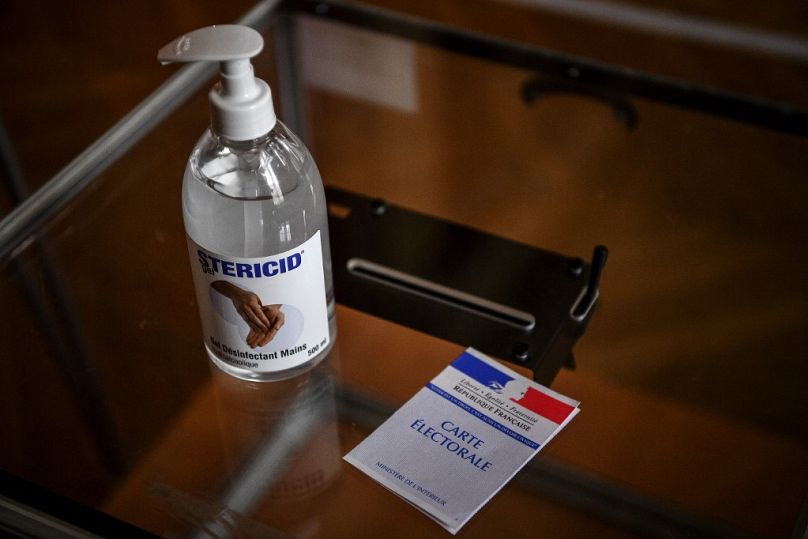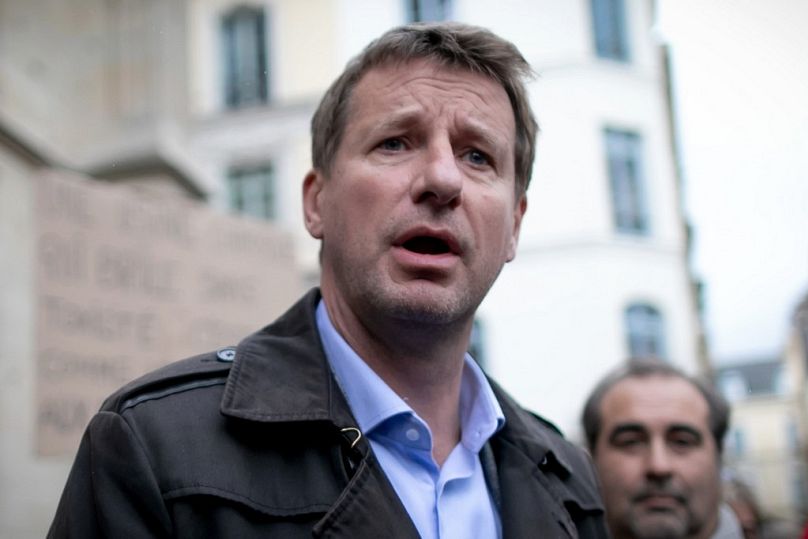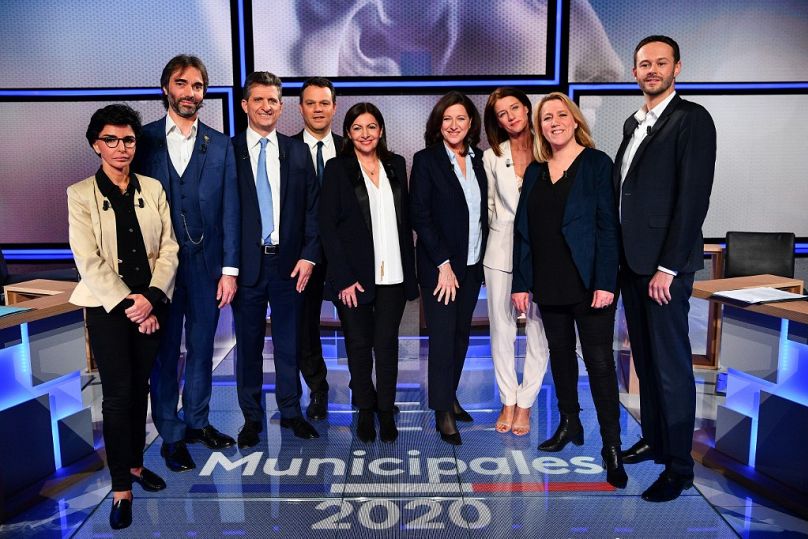The first round of the French local election was maintained despite the spread of the coronavirus pandemic. The next day, the country went on lockdown. Now the second round is being held on 28 June.
France is finally set to conclude its local elections that were halted at the height of the country's coronavirus outbreak.
 ADVERTISEMENT
ADVERTISEMENT
 ADVERTISEMENT
ADVERTISEMENT
Despite concerns, the first round of voting went ahead on March 16, but the next day France was put on lockdown.
That saw the second round of voting, set for a week later, postponed. Now, with confinement measures lifted, it will go ahead on Sunday (June 28). It's the first time two rounds of voting have been so far apart.
In French local elections, citizens elect their mayors, who run city or town councils and set local policy. They also are representatives of the state's executive power at the local level. As such, the mayoral elections can be an important gauge of the balance of power in French politics.
How do municipal elections work in France?
Candidates set up a list of people they want on their council. The candidate whose list gets most votes becomes mayor, and the council is made up of people high on their list, plus people high on the other lists proportionally to the votes they got.
If a candidate (or "head of list") receives more than 50% of the vote in the first round, he or she is elected mayor. If no candidate gains a majority in the first round — a common occurrence — candidates with over 10% of the vote face each other in a run-off.
Some cities and towns elected their mayor in March because he or she gained more than half the votes. They have already started their new mandates.
In others, another round of voting is needed to decide on the new mayor, so the previous team stays in place.
Only about 5,000 towns and cities will hold a second round to elect the mayor.
Which are the main parties?
La France Insoumise (FI) (left-wing)
Instead of setting up lists with FI members as candidates, leader Jean-Luc Melenchon has encouraged and supported "citizen lists", which have bloomed from local groups and citizen initiatives around France.
In doing this, FI has said it wants to support local "auto-organisation" that it hopes could lead to a "citizen revolution".
But the party performed badly in the European elections, winning just 6 per cent of the vote.
In some cities, like Montpellier or Perpignan (south), FI has allied with other left-wing parties.
Melenchon has stressed that the municipal elections are not FI main goal. He has his eyes, and his movement, set on the 2022 presidential election.
The Socialists (centre-left)
Incumbent Socialist mayor Anne Hidalgo is polling at around 44 per cent in Paris, ahead of her main opponent, Republicains candidate Rachida Dati.
The Socialists have struggled since their presidential candidate only won 6 per cent of the vote in 2017. The party still holds 12 cities of more than 100,000 people, which it hopes to keep.
It could do so and has bet on "union lists" with other left-wing parties, such as Jean-Luc Melenchon's FI, but holding Paris is its main goal.
The Green Party (environmental, centre left)
The Greens won 13,48 per cent of the vote in last year's European elections and are polling at 20 per cent in some cities.
"The time of the Greens has come," party leader Yannick Jadot has said ahead of the municipal elections.
The party could benefit from vote transfers in the second round.
La Republique En Marche (LREM) (centre-right, liberal)
French President Emmanuel Macron's La Republique En Marche (LREM) is the newcomer in the race: in the last municipal elections in 2014, the party wasn't even founded and Macron had not even been appointed economy minister by then-president Francois Hollande.
LREM won a parliamentary majority in 2017, the year Macron was elected president. It came second at last year's European elections, behind Marine Le Pen's far-right party, Rassemblement National (RN).
Macron said in January that he wasn't concerned with the vote, declaring that "local elections are local elections". But it remains a big test ahead of the next presidential election in France in 2022. Macron’s support has waned in the face of the "gilets jaunes" ("yellow vests") crisis and the government has been criticised over its handling of the coronavirus crisis. Macron's party must now prove that it can win in French regions and rural areas.
In the first round in Paris, the LREM candidate Agnes Buzyn ran against an LREM ex-member, former Macron advisor Cedric Villani, who did not qualify for the second round.
Around 2,000 councillors across France have become LREM members since 2017, but the party is hoping to gain far more, around 10,000, at the municipal elections.
Les Republicains (LR) (right-wing)
After failures at the presidential and parliamentary elections, and disastrous results in the European elections last year (8.5% of the vote), it would be a huge win for Les Republicains.
The party also hopes to keep big southern cities like Nice and Marseille. In some places, it has struck an alliance with Macron's LREM, such as in Toulouse where the LR candidate Jean-Luc Moudenc has LREM's support.
Yet with Sarkozy's former PM François Fillon currently on trial - accused of having given his wife a "fake job" as a parliamentary assistant for which he paid her over €1 million in public funds - the party has known better days.
Rassemblement National (RN) (far-right)
Marine Le Pen's far-right RN came first in the 2019 European elections and hopes to continue the trend.
In 2014, the party — back then still named National Front — won in eleven towns made up of more than 9,000 people. It hopes to gain more this time and has called for outsiders to run as RN candidates.
But it isn't targeting big cities: the biggest city in which there is an RN candidate is Perpignan, southern France, with a population of 121,000. It came first in Perpignan in the first round.
Can Macron's party make big gains?
This election is risky for the ruling party, which struggled in the regions during the "gilets jaunes" ("yellow vests") crisis last year.
But while it may win in some big cities, in smaller cities and towns where the party's roots are weaker, LREM has played it safe. It has sent candidates in only half of France's towns of 10,000 people, often choosing to support LR candidates instead of sending their own.
Several ministers of Macron's cabinet have run for mayoral positions.
French prime minister Edouard Philippe is running for re-election as mayor of Le Havre (northern France), where he came first the first round with 43% of the vote.
Minister Gerald Darmanin was elected mayor of Tourcoing (in the north, too) in the first round, and Secretary of State Sébastien Lecornu was elected on the winning list in Vernon, in Normandy.
Secretaries of State Marlène Schiappa is also running on a list in Paris' 14th arrondissement.
The Agriculture minister Didier Guillaume set up a list to run in Biarritz (southwest) but abandoned the race before the first round.
Between the "gilets jaunes" ("yellow vests") movement and the various strikes, the protests against Macron's controversial pensions reform, and the government's response to the coronavirus crisis, LREM's image has suffered.
In some cities like Nantes, Dijon and Strasbourg, during the first round, LREM candidates even concealed the party's logo on their posters.
In Paris, there are two levels for the vote: one for the Paris mayoralty, and 20 others for each city borough.
Three lists for the Paris mayoralty have made it to the second round: that of Socialist incumbent Hidalgo (23.33% of the vote in the first round), right-winger Rachida Dati (29.72%) and LREM's Agnes Buzyn (17.26%).
This forecasts a major loss for Macron's LREM party since its candidate Benjamin Griveaux dropped out of the race in February after the release of private sex videos.
Griveaux had been trailing in polls for weeks before he quit the race, partly due to bizarre campaign pledges such as replacing Paris' Gare de l'Est — the train station linking the city with eastern France — with a "central park".
He was replaced in the Paris race by former health minister Agnes Buzyn, who chose to leave her cabinet post as the coronavirus outbreak hit France.
As she is trailing third, this decision is now likely to come to haunt her.
What about the coronavirus situation in France?
The coronavirus outbreak has slowed down in France, but social distancing measures remain in place.
On June 28, voters at polling stations will be asked to remain at least one metre apart from each other, and if possible to use their own pen.
Each polling station will offer hand sanitiser or water and soap.
Participation at French municipal elections has constantly decreased since 1983. Around 44 per cent of French citizens went to the polling station for the first round of the municipal elections.













